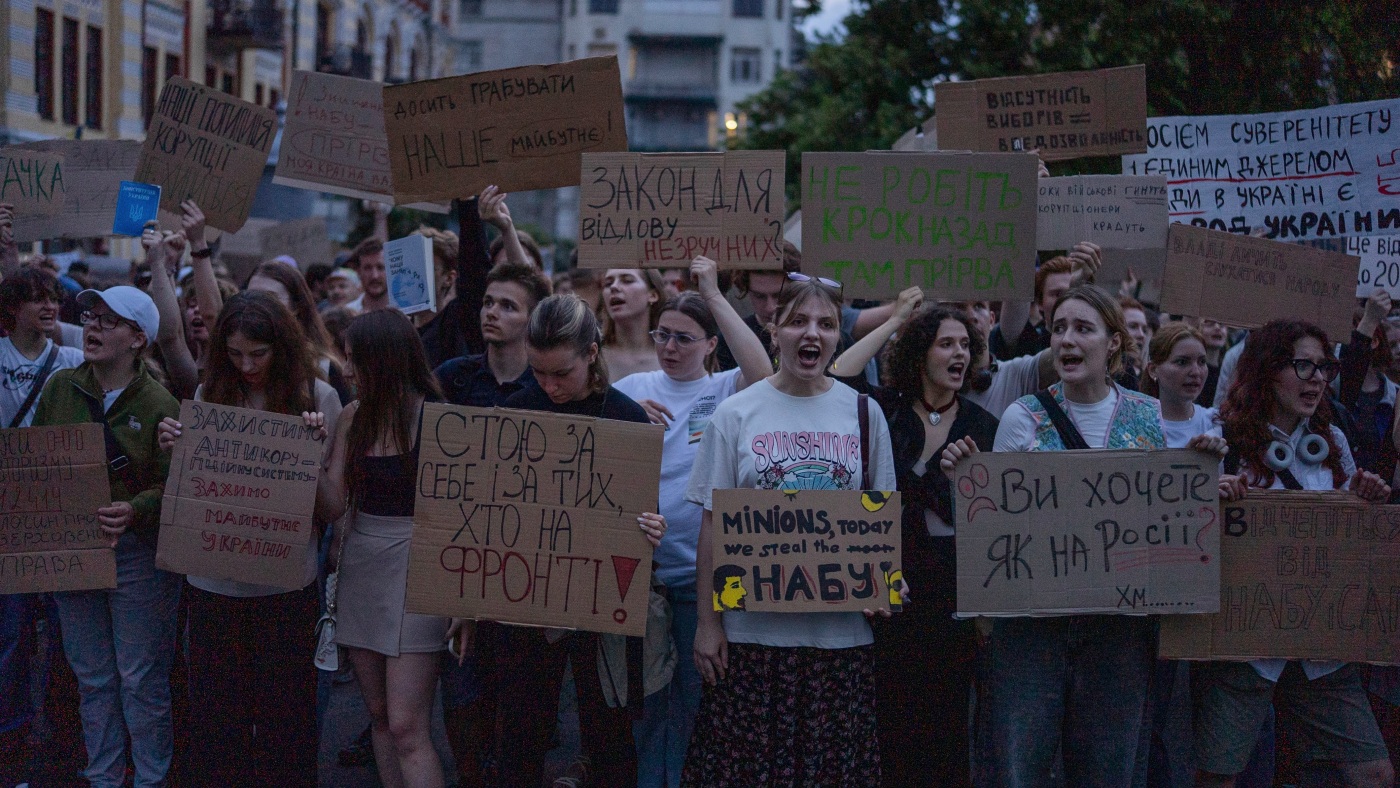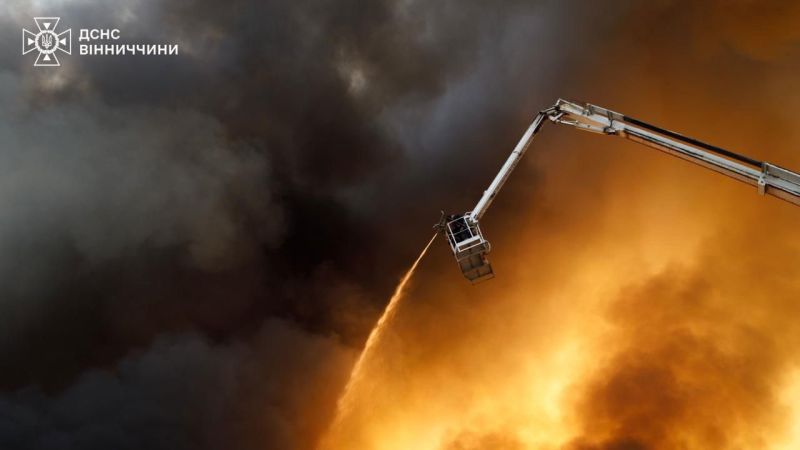Ukrainian President's Actions Spark Protests

Introduction
Ukrainians have taken to the streets to protest against the recent actions of their president, Volodymyr Zelensky, in his efforts to crack down on corruption watchdogs. This move has sparked fear and alarm among citizens, as fighting corruption has been a central issue for Ukrainians since the pro-Western protests a decade ago.
Key Details
The new curbs on watchdog agencies have raised concerns about the government's commitment to fighting corruption. Many fear that this could lead to a regression in the progress made in the country's anti-corruption efforts. The National Anti-Corruption Bureau of Ukraine (NABU) and the Specialized Anti-Corruption Prosecutor's Office (SAPO) have been the primary targets of Zelensky's actions. This has led to accusations of political interference and a lack of independence for these agencies.
Impact
The crackdown on corruption watchdogs has highlighted the ongoing battle between the Ukrainian government and its citizens, who demand a more transparent and accountable government. This move has raised concerns about the country's commitment to its European integration and the fight against corruption, which are crucial for the country's economic and political stability. It also brings into question the true intentions of Zelensky's administration and its promise to bring real change to the country.
About the People Mentioned
Volodymyr Zelensky
Volodymyr Zelensky is a Ukrainian politician and former comedian who was born on January 25, 1978, in Kryvyi Rih, Ukraine. Prior to his political career, he gained fame as an actor and comedian, notably for his role in the TV series "Servant of the People," where he portrayed a teacher who becomes president. This role ironically foreshadowed his future as the sixth president of Ukraine, a position he assumed on May 20, 2019, after winning the presidential election on April 21, 2019[1][2][4]. Zelensky's presidency has been marked by significant challenges, including the COVID-19 pandemic and escalating tensions with Russia. His leadership during these crises has been notable, particularly his response to the Russian invasion of Ukraine in February 2022. He became an international symbol of resistance, refusing evacuation offers and rallying global support for Ukraine. Under his leadership, Ukraine has received substantial international military and financial aid[1][3]. One of Zelensky's key achievements is his ability to unite Ukrainians and communicate effectively with the international community. His presidency has been recognized globally, with Time Magazine naming him Person of the Year in 2022 for his leadership during the Russian invasion[1][3]. Despite lacking prior political experience, Zelensky has demonstrated resilience and strategic communication skills, which have been crucial in navigating Ukraine through its most challenging moments. Currently, Zelensky remains a central figure in international politics, especially in the context of the ongoing conflict with Russia. His commitment to defending Ukraine's sovereignty has garnered widespread support, both domestically and internationally. Zelensky is married to Olena Zelenska and has two children, balancing his public duties with family life[1][4].
About the Organizations Mentioned
National Anti-Corruption Bureau of Ukraine
The **National Anti-Corruption Bureau of Ukraine (NABU)** is a central executive agency tasked with preventing, detecting, and investigating corruption and other criminal offenses within its jurisdiction. Established in response to the European Union's Visa Liberalization Action Plan, NABU was created to address corruption, a significant obstacle to Ukraine's development[1][2]. ## History NABU was formed following the adoption of the Law "On the National Anti-Corruption Bureau of Ukraine" on October 14, 2014. In April 2015, President Petro Poroshenko signed decrees to establish the bureau and appoint Artem Sytnyk as its director[1][4]. This marked a significant step in modern Ukraine's efforts to combat corruption. ## Key Achievements Since its inception, NABU has been involved in numerous high-profile investigations, including cases involving state-owned companies and government officials. One of its early achievements was entering its first criminal proceedings into the Unified Register of Pre-Trial Investigations in December 2015, concerning the theft of state funds[1]. ## Current Status Recently, NABU faced challenges when Ukraine's parliament passed a law transferring control of NABU and the Specialized Anti-Corruption Prosecutor's Office (SAPO) to the Prosecutor General's Office. This move was widely criticized and sparked protests, but was later reversed to restore the agencies' independence[5][8]. ## Notable Aspects NABU operates independently, focusing on corruption among top government officials, including the president, parliament members, and cabinet ministers[2]. Its independence is crucial for maintaining trust in Ukraine's anti-corruption efforts. Despite recent challenges, NABU remains a vital institution in Ukraine's fight against corruption, supported by international organizations and civil society[5][6].
Specialized Anti-Corruption Prosecutor's Office
The **Specialized Anti-Corruption Prosecutor's Office (SAPO)** is a pivotal institution in Ukraine's fight against corruption, established in 2015 as part of broader anti-corruption reforms. SAPO's primary mandate is to prosecute high-level corruption cases, including criminal offenses committed by senior public officials and those that threaten national security[2][4]. Historically, SAPO was created alongside the National Anti-Corruption Bureau of Ukraine (NABU) to address corruption within central and local government institutions, a condition set by the International Monetary Fund and European Commission for visa liberalization[4]. SAPO's role involves supervising investigations conducted by NABU detectives and ensuring compliance with the law during pre-trial investigations. It also represents the prosecution in court[1]. Despite being part of the Prosecutor General's Office, SAPO operates independently, with appointments made through open competitions[1][4]. Notable achievements include the launch of hundreds of investigations against corruption, often in collaboration with international bodies[7]. In 2024, SAPO was reorganized as an independent prosecutorial body, enhancing its autonomy and international cooperation[2]. However, recent legislative changes have raised concerns about SAPO's independence, with the Prosecutor General gaining more powers[6]. SAPO's current status reflects ongoing efforts to balance independence with institutional reform. Despite these challenges, SAPO remains crucial in Ukraine's anti-corruption agenda and its integration efforts with the European Union[5][6]. The organization's ability to collaborate internationally and its role in advancing Ukraine's anti-corruption reforms make it a significant player in the country's legal landscape.


















